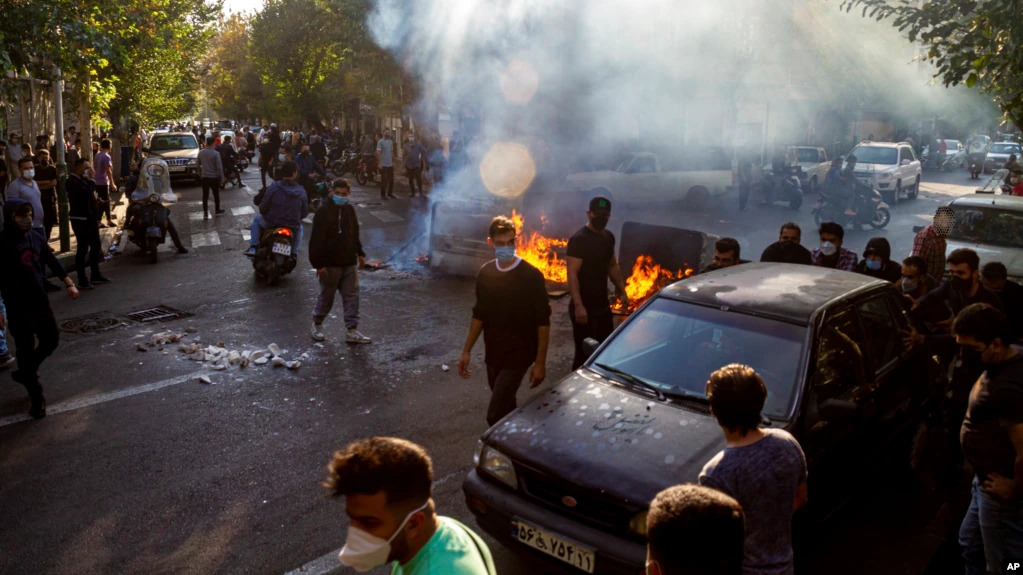A Tehran court has issued the first death sentence over the protests in Iran that have shaken the country's clerical leadership.
The person sentenced to death in a Tehran court, who was not identified, was found guilty of “setting fire to a government building, disturbing public order, assembly and conspiracy to commit a crime against national security”, being “an enemy of God” and partaking in “corruption on earth”, the judiciary website Mizan reported on November 13.
The sentence was the first of its kind issued by the courts since protest gatherings began in mid-September, triggered by the death of Mahsa Amini in police custody. A total of 341 protesters, including 52 children, were killed so far, since the beginning of the protests, according to the foreign-based Human Rights Activists' News Agency (HRANA). The report added that about 40 members of the police, the Islamic Revolution Guards Corps (IRGC) and the Basij paramilitary forces were killed since the beginning of the protests.
Another court in Tehran sentenced five others to prison terms of between five and 10 years for “gathering and conspiring to commit crimes against national security and disturbing public order”.
Earlier this month, 272 of Iran's 290 lawmakers called for the death penalty against those who “have harmed people's lives and property with bladed weapons and firearms”.
In late September, Iran's Judiciary Chief Gholamhossein Mohseni Ejei ordered the prosecutor general and other judicial authorities to deal with "rioters" and asked them to act within the framework of the law, but "without showing any leniency".
Iran's judiciary has recently charged more than 750 people in three provinces for participating in riots. More than 2,000 people had already been charged, nearly half of them in the capital Tehran, since the demonstrations began in mid-September, according to judiciary figures.
Iran has carried out numerous drone and missile attacks on Iranian Kurdish groups based in the northwestern provinces and also Iraqi Kurdistan, which it accuses of instigating protests following the death of Mahsa Amini, an Iranian Kurdish woman. Iran’s Kurdish-populated provinces also suffered the highest rate of fatalities in nationwide protests.
Iran's Islamic Revolution Guards Corps (IRGC) once again hit "terrorist parties' bases" in Iraqi Kurdistan. "In these attacks, the positions of these groups were hit with drones and missiles," Fars reported on November 14.
On November 14, the commander of the IRGC Ground Forces, Brig Gen Mohammad Pakpour said that "footprints of the counter-revolution and separatist elements from various bases in northern Iraq could be traced in some of the riots in the north-western parts of the country".
He also accused these groups of carrying out "terrorist acts" in West Azerbaijan, Kordestan and Kermanshah provinces, saying that most of those recently arrested in the north-western provinces have been "members of anti-revolutionary and separatist groups based in northern Iraq".
On November 13, the IRGC commander in the north-western province of West Azerbaijan bordering Iraq’s Kurdistan Region, Brigadier General Mohammad Taqi Osanlou, reported the arrest of over 100 members of "counterrevolutionary" and Kurdish groups in a recent wave of protests.
Osanlou revealed that members of the Komala Party and Democratic Party of Iranian Kurdistan (PDKI) had been arrested in recent months.
The commander warned that the authorities in the Kurdistan Region of Iraq and other "counterrevolutionary" groups established on Iraqi territory pose a threat to both countries.
Iran’s Intelligence Minister Esmail Khatib on November 9 said that among those arrested during the protests, over 150 had been affiliated with "Kurdish terrorist groups", and a hundred others had been linked to the exiled opposition group Mojahedin-e Khalq (MKO/MEK).
However, Iran was one of the first countries to open an official diplomatic mission in Iraqi Kurdistan, with consular offices in both Erbil and Sulaymaniyah. Iranian forces backed the Kurds in their fight against the Islamic State group (ISIS/ISIL) in some areas of northern Iraq in 2014.







 President Aliyev emphasized the critical role of the North-South Transport Corridor in fostering transport cooperation between Azerbaijan and Russi...
President Aliyev emphasized the critical role of the North-South Transport Corridor in fostering transport cooperation between Azerbaijan and Russi...
 Armenian sappers commenced on Monday mine-clearance operations in the territories adjacent to the Saint Mary Church in village of Voskepar (Armenia...
Armenian sappers commenced on Monday mine-clearance operations in the territories adjacent to the Saint Mary Church in village of Voskepar (Armenia...
 The Mine Action Agency of Azerbaijan (ANAMA) reported on Thursday the discovery of a significant amount of explosives in the Khojavand district of ...
The Mine Action Agency of Azerbaijan (ANAMA) reported on Thursday the discovery of a significant amount of explosives in the Khojavand district of ...
 Russian Foreign Minister Sergei Lavrov has reasserted that Moscow has no intentions to stop the fighting in Ukraine, even if peace talks commence.
Russian Foreign Minister Sergei Lavrov has reasserted that Moscow has no intentions to stop the fighting in Ukraine, even if peace talks commence.



